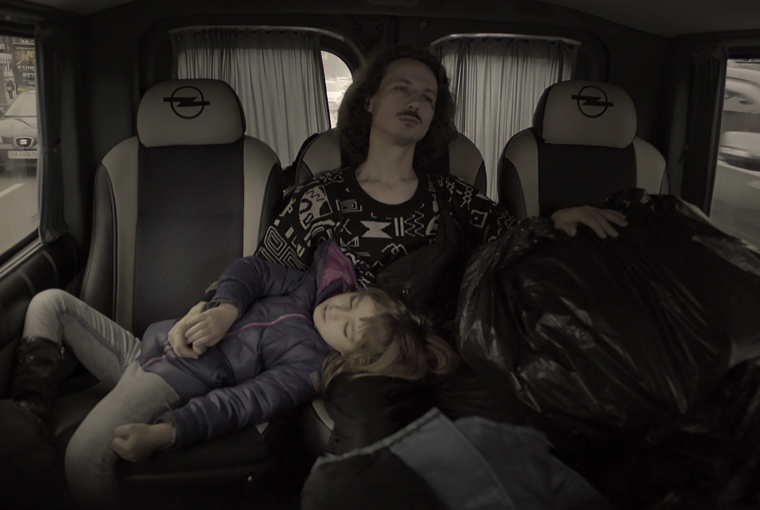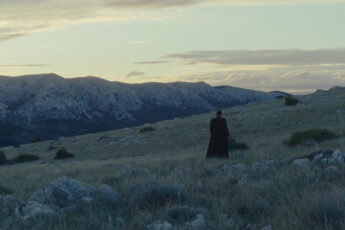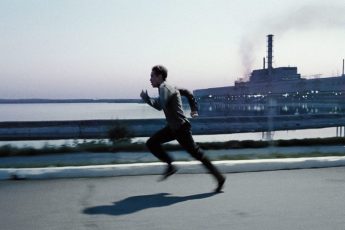“Back When I Was Thirty the World Was Very Cruel”
Vadym Ilkov’s My Father is My Mother’s Brother (Tato – mamyn brat, 2018)
Vol. 92 (February 2019) by Jack Page
Ilkov’s documentary is an intimate portrait that chronicles the unconventional life of bohemian Tolik. Underground artist and musician, Tolik spends his days juggling a routine of painting, song writing and caring for his sprightly young niece Katya.
Quite innovatively, the cryptic title of the film is the only explanation the audience receives in regard to Tolik and Katya’s relation to one another. The exact history of how he came to be her guardian is left unsaid, prompting the viewer to piece together clues that might otherwise explain the links within the family dynamic. The assumption is that Tolik’s sister Anya suffers strongly from a mental illness that has prevented her from looking after her daughter Katya as well as herself. Tolik has at some earlier stage intervened and taken it upon himself to rear the child and financially support his sister. Interestingly, the film slowly reveals Anya’s psychological condition with gradual severity. As a result, towards the beginning of the documentary at least, the audience is preoccupied by the mysterious circumstances that deter mother and daughter from seeing each other. Similarly, the major issue of Katya’s suspiciously absent birth father also goes unexplored. These missing key factors that would usually help audiences to empathize or simply establish characters’ motivations and personalities lend the film a sense of novelty. Ironically, it is a documentary about not knowing.
The very first scene of the film introduces Anya and Tolik, who meet outside a quiet metro station on a crisp, sunny morning. Their breath punctuates the space between them, their mouths billowing faint clouds of white and grey as the drone of traffic mumbles on in the distant background. She asks for money for utility bills and he insists on accompanying her to the pharmacy to pick up her prescription. When they hug each other goodbye she asks for another, extra embrace. Here, Anya shows no signs of mental illness. She acts lovingly and with an air of nonchalance (although she slyly avoids being chaperoned by her brother). Later on, the camera is not so kind and the scenes that follow her mainly focus on her disabilities. Shot inside her bedsit, Anya lives a solitary existence. In the kitchen, she slouches in a chair next to the table, chain-smoking and sipping tea. She stares blankly outside the window, unblinking. She excessively scratches her scalp with her yellow stained fingers, showering her torso with dandruff. In the next shot she has shaved her head. She reads books aloud to the television set or stands stock still in the living room in complete darkness with nothing but the sound of the incessantly ticking clock.
Anya’s incapability as a mother is illustrated in the final sequence of the film. At Katya’s birthday party, she tries to retell her daughter a longwinded fairytale. Throughout the story, Katya asks her mother questions about the characters, which are ignored as Anya refuses to be interrupted. When Anya is finally distracted and she loses her train of thought, Katya flees. Confused and bewildered, Anya is resigned to the fact she has lost her daughter. This tragic conclusion is just an indicative glimpse of many other difficulties she might have to face on a daily basis as Katya’s guardian. This example is even more unfortunate because it is the first time the audience is exposed to Anya’s parental intention. The fact of how labored the process of merely regaling Katya with a bedtime story is for her, suggests that the task is impossible.
The main successful accomplishment of Ilkov’s feature is its character study of the hipster Tolik, who proves to be a sweet source of surprise and entertainment. His presence provides the spectator with a complex protagonist in an otherwise typical documentary format. He seems caught in a tumultuous balancing act between ideal father and inexperienced babysitter. With his wiry frame, messy hair and second-hand clothes, Tolik looks out of place in the domestic sphere, like a worn out rock star lost in his own home. Comforting the sickly and precocious Katya on the sofa, he dozes off to sleep in front of the camera. She runs rampant in his studio while he tries to work, and the camera often lingers on the moments when Tolik is fixated on his smart-phone rather than keeping an eye on the young girl. His parenting methods are somewhat questionable, notably during band practice when he sings lewd, inappropriate lyrics with his niece on his lap (“I jerked off to myself… fuck me baby, please”). He spends many weeknights partying, sweaty and shirtless on stage. In these moments, he looks so far removed from parenthood that he almost seems to be regressing back into adolescence himself. But these scenes are consistently undermined by his responsible efforts to be a father, be it grounding and reprimanding a naughty child or mollycoddling Katya when she is unwell. In this respect I do believe that Ilkov is aiming to test traditional representations and challenge stereotypes of fatherhood. What should a “real” father act and look like? Does Tolik embody both mother and father models, and what impact does that have on gender roles? Like any single parent, Tolik embodies the fluidity between mother and father, which is emphasized by his own effeminate and camp nature. It also proves that you do not necessarily need to be of a specific gender or sexuality to fill the role of mother or father and in the case of nurturing life, there isn’t really any difference between the two.
When Tolik and Katya are forced to downsize from their home, the sheer physical and mental endurance of being a single parent are clearly displayed. Tolik is left to singlehandedly move his life’s belongings up and down flights of stairs in a rundown high-rise on the outskirts of town. A tracking shot is framed a few feet behind him as he struggles to lift bursting rubbish bags filled with all his worldly possessions. He buckles over at the weight of some of them. Outside, the moving van’s engine roars to life and leaves the deserted parking lot. A long take focuses on the piles of Tolik’s things that have been left unattended as if to say no one else will help with their emotional baggage. This poignant message of individual perseverance and optimism in the face of adversity, stands at the center of Ilkov’s film.




Leave a Comment